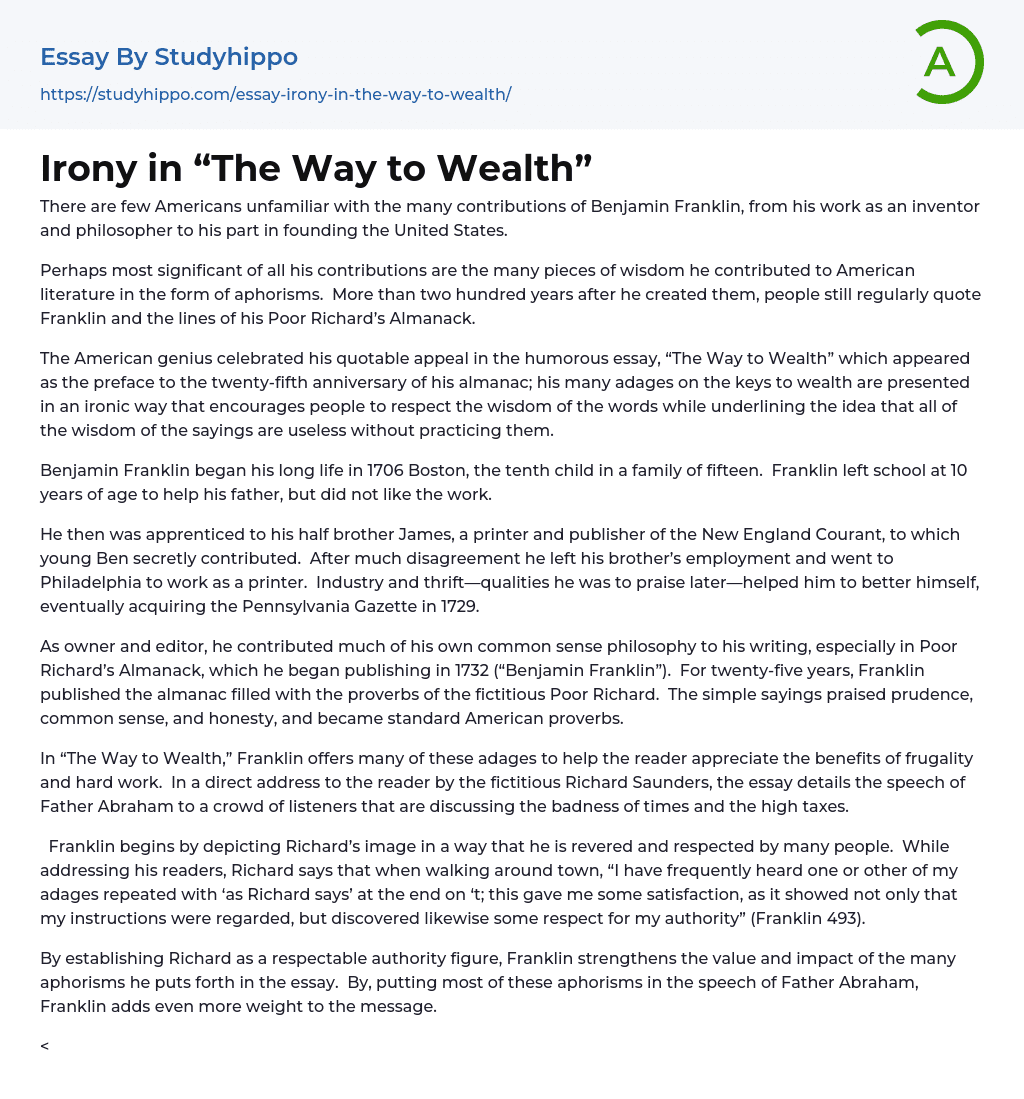There are few Americans unfamiliar with the many contributions of Benjamin Franklin, from his work as an inventor and philosopher to his part in founding the United States.
Perhaps most significant of all his contributions are the many pieces of wisdom he contributed to American literature in the form of aphorisms. More than two hundred years after he created them, people still regularly quote Franklin and the lines of his Poor Richard’s Almanack.
The American genius celebrated his quotable appeal in the humorous essay, “The Way to Wealth” which appeared as the preface to the twenty-fifth anniversary of his almanac; his many adages on the keys to wealth are presented in an ironic way that encourages people to respect the wisdom of the words while underlining the idea that all of
...the wisdom of the sayings are useless without practicing them.
Benjamin Franklin began his long life in 1706 Boston, the tenth child in a family of fifteen. Franklin left school at 10 years of age to help his father, but did not like the work.
He then was apprenticed to his half brother James, a printer and publisher of the New England Courant, to which young Ben secretly contributed. After much disagreement he left his brother’s employment and went to Philadelphia to work as a printer. Industry and thrift—qualities he was to praise later—helped him to better himself, eventually acquiring the Pennsylvania Gazette in 1729.
As owner and editor, he contributed much of his own common sense philosophy to his writing, especially in Poor Richard’s Almanack, which he began publishing in 1732 (“Benjamin Franklin”). Fo
twenty-five years, Franklin published the almanac filled with the proverbs of the fictitious Poor Richard. The simple sayings praised prudence, common sense, and honesty, and became standard American proverbs.
In “The Way to Wealth,” Franklin offers many of these adages to help the reader appreciate the benefits of frugality and hard work. In a direct address to the reader by the fictitious Richard Saunders, the essay details the speech of Father Abraham to a crowd of listeners that are discussing the badness of times and the high taxes.
Franklin begins by depicting Richard’s image in a way that he is revered and respected by many people. While addressing his readers, Richard says that when walking around town, “I have frequently heard one or other of my adages repeated with ‘as Richard says’ at the end on ‘t; this gave me some satisfaction, as it showed not only that my instructions were regarded, but discovered likewise some respect for my authority” (Franklin 493).
By establishing Richard as a respectable authority figure, Franklin strengthens the value and impact of the many aphorisms he puts forth in the essay. By, putting most of these aphorisms in the speech of Father Abraham, Franklin adds even more weight to the message.
Father Abraham quotes the words of the respected Poor Richard. His name gives a sense of Biblical authority and wisdom, and the townspeople appeal to the wise old man for advice on the current dismal state of economic affairs.
Delivered much like a sermon, the words of Father Abraham recall the sayings of Poor Richard, a sly narrative technique of Franklin to reinforce
the impact of his twenty-five years of aphoristic wisdom. Franklin believed that wealth was important because it led to both frugality and industry, and Father Abraham echoes this sentiment by recalling the words of Richard: “a word to the wise is enough, and many words won’t fill a bushel” (493).
The townspeople clamor for Father Abraham to continue, establishing their respect for his wisdom and encouraging the reader to do the same. In effect, this respect for the words of Father Abraham is respect for the source of his quoting: Poor Richard.
Subsequently, it is the words of Franklin that the fictitious crowd desires to hear. Father Abraham continues to quote Poor Richard with a number of sayings that instruct people on how to conduct their finances, as Franklin challenges his readers to pay heed to the words of wisdom, yet continue to think for themselves.
- Frederick Douglass essays
- Mahatma Gandhi essays
- Joseph Stalin essays
- Geert Hofstede essays
- George Eliot essays
- Ginevra King essays
- John Keats essays
- Siegfried Sassoon essays
- Ben jonson essays
- Billy elliot essays
- Wilkie collins essays
- John Proctor essays
- Harriet Tubman essays
- Napoleon essays
- Robert E Lee essays
- Rosa Parks essays
- Dred Scott essays
- Book Summary essays
- Metaphor essays
- Reader essays
- Rhyme essays
- Literary devices essays
- Villain essays
- Books essays
- Genre essays
- Literary Criticism essays
- Writer essays
- Protagonist essays
- Simile essays
- Poem essays
- Book Report essays
- Book Review essays
- Greek Mythology essays
- Plot essays
- Tragic Hero essays
- Coming of Age essays
- Play essays
- Rhetoric essays
- Rhetorical Question essays
- Translation essays
- Understanding essays
- Reason essays
- Character essays
- Letter essays
- American Literature essays
- Literature Review essays
- Utopia essays
- Poetry Analysis essays
- Dante's Inferno essays
- Between The World and Me essays




